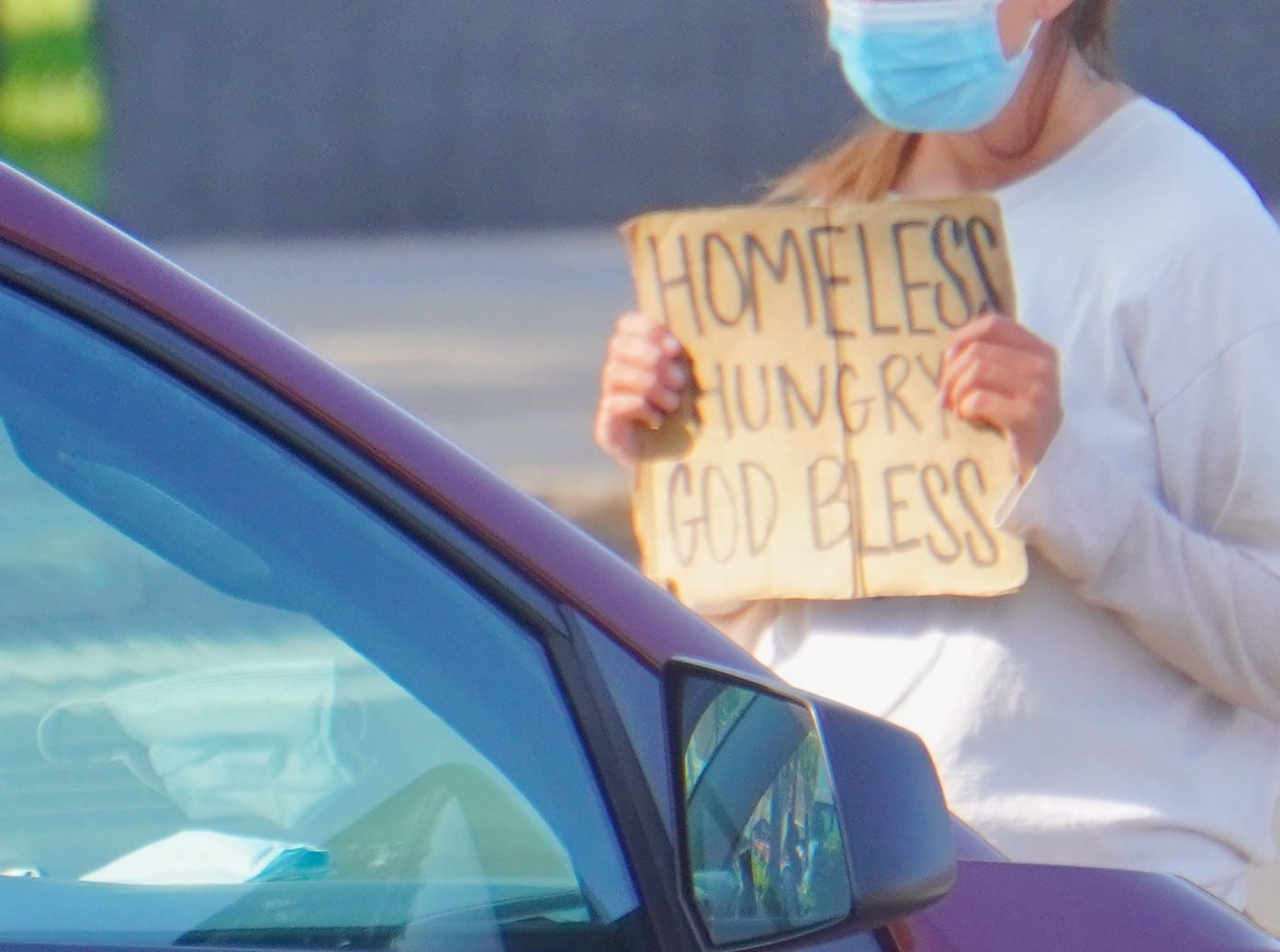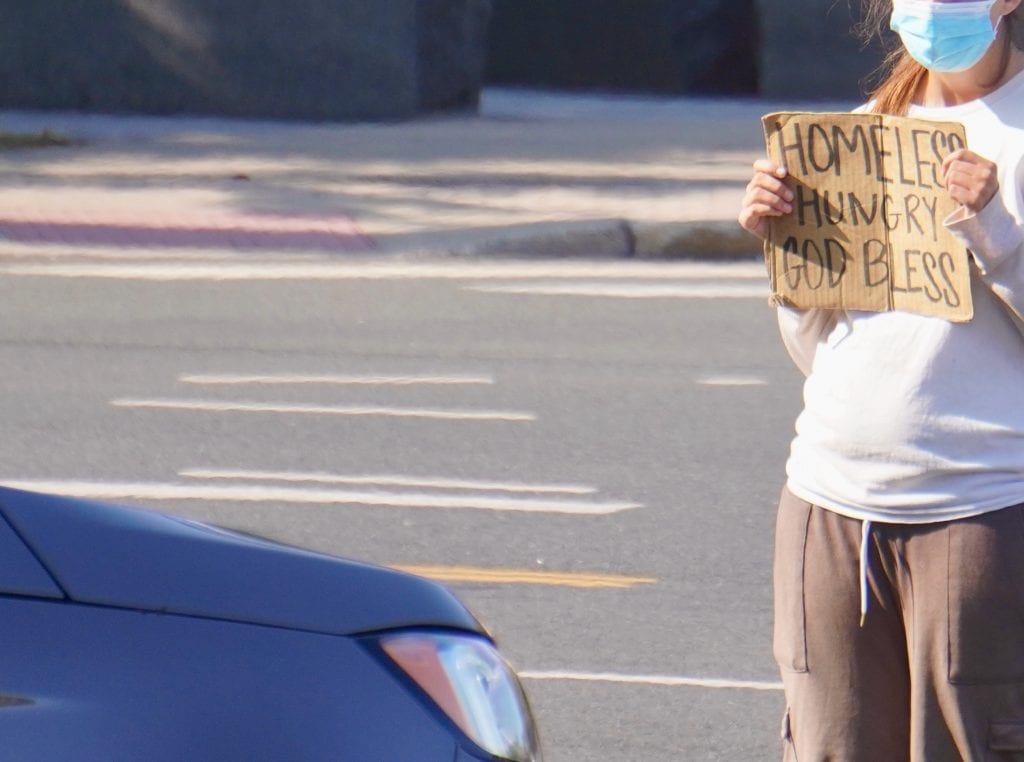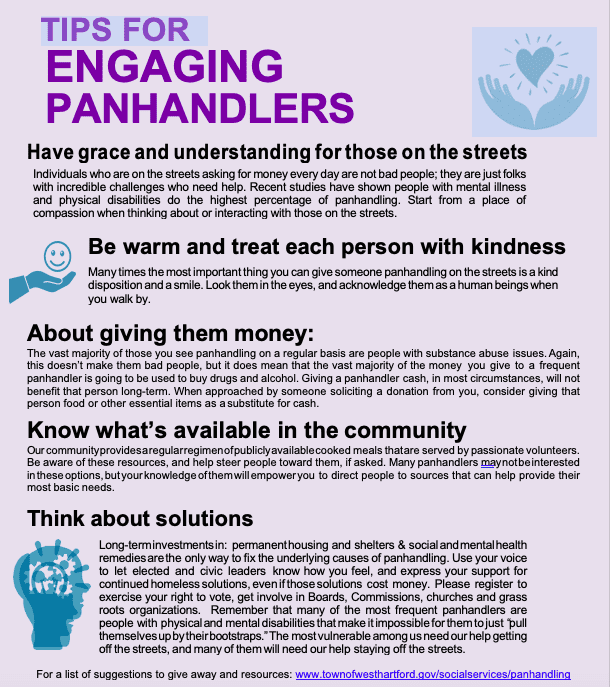West Hartford Police, Social Services Address Increase in Panhandling

Audio By Carbonatix

A panhandler stands on the Town Green at the corner of South Main Street and Farmington Avenue in West Hartford Center. Photo credit: Ronni Newton
West Hartford Police and the Social Services Department are working together with a multi-pronged approach to panhandling, including educating the public, and one of the primary messages is to never give money to panhandlers.
By Ronni Newton
On any given day someone driving through West Hartford is likely to find a person standing on a corner with a sign asking for some type of help, and since the COVID-19 pandemic began there has been a noticeable increase in panhandling activity in town.
“There is nothing inherently illegal about standing on a public sidewalk or on private property with permission from the property owner and asking for money or food or a job,” Town Manager Matt Hart told We-Ha.com in a discussion about the topic of panhandling. “What is problematic is if the panhandler engages in aggressive panhandling, coerces someone, or puts themself or the public in harm’s way.”
On a recent Sunday afternoon, a 13-year-old girl and her friend were sitting on a bench in West Hartford Center enjoying some bubble tea when they were approached by a man walking with a cane.
“He told her he had just gotten out of jail, and asked her for money,” said the teen’s mom, who asked that her name not be used to protect her daughter’s privacy.
The girl had some cash, visible in her clear phone case. “She and her friend were very scared,” the mom said. Her daughter gave the man $10, but he could see she had some more money in her phone case, and he told her he wanted that, too. She gave him her remaining $2, and after the man walked away, the daughter called her mom, who said she immediately contacted West Hartford Police.
That incident would qualify as aggressive panhandling, and Assistant Chief Dan Coppinger confirmed that police are pursuing charges against this particular suspect, who is well known to police.
The man who approached the teen and her friend has had 55 interactions with police, has been arrested at least 13 times in the past (taken into custody five times and arrested eight times by warrant), Coppinger said. He has been committed to the hospital on multiple occasions as well. Online court records indicate that he is due to be arraigned in October on a slew of charges from incidents in West Hartford as well as Hartford, charges that include sixth-degree larceny, first-degree criminal trespass, second-degree breach of peace, and failure to appear.
The law, and what can be done
Many in the general public think that the town can just pass an ordinance making panhandling illegal, but that’s not possible, Hart said.
A 2015 U.S. Supreme Court case case, Reed v. Town of Gilbert, clarified when municipalities may impose content-based restrictions on signage. While panhandling was not the actual subject of the suit, the court’s decision, which was unanimous, resulted in the invalidation of many panhandling ordinances, Hart said.
“The majority of municipalities that implemented town ordinances prohibiting panhandling are now having to change them because they’re unconstitutional,” Coppinger said.
“Police can still take action to curb aggressive panhandling,” Hart said. “We can also work with social services to address panhandling in a holistic way,” he added.
Hart, Coppinger, Manager of Social Services Astrid Calderon, and Director of Leisure and Social Services Helen Rubino-Turco provided a report to a special meeting of the West Hartford Town Council Monday night, outlined the interdepartmental response to panhandling.
Council member Chris Williams and Minority Leader Lee Gold asked Hart to take another look at Hartford’s panhandling ordinance, which prohibits panhandling when there is a “captive audience” and not the subject of the First Amendment rights protected in the Reed v. Town of Gilbert case. Williams said that since most of the panhandling in West Hartford occurs while motorists are stopped at an intersection, he believes that could qualify as a “captive audience” and possibly be addressed by ordinance.
Hart said he would look further into Hartford’s statute.
What to do when confronted by a panhandler
As part of West Hartford’s multi-disciplinary approach, officials are still encouraging people to call the police immediately if you are the victim of aggressive panhandling, or if you witness someone else becoming the victim of aggressive panhandling.
An equally critical message: “Please, please, please, don’t give them money, no matter what. If you give them money they will come back,” Hart said.
“Giving money might make you feel good,” Coppinger said, but it may end up feeding into the panhandler’s addiction, or make it worth their while to continue what they’re doing.
What’s best is intervention, Coppinger said, and if you want to give money, then donate to a nonprofit that provides support services.
Who are the panhandlers, and why are they here
West Hartford Police know most of the regular panhandlers in town by name, and they make it a point to speak with them regularly.
In 2019, the West Hartford Police Department’s Community Services Unit was continuously in touch with those who regularly panhandled in town, and handed out “CARES” cards that contained a list of resources. “Almost 100% of everyone we spoke to said, ‘Thank you, but we don’t want anything,'” Coppinger said.
After COVID-19 resulted in the shutdown of businesses, there was a lot less foot traffic in Hartford, and the panhandlers left the city as well. At the same time, buses fares were reduced or eliminated, making it easier for panhandlers to find new territories. Many travel up and down the busway, Coppinger said.
The panhandlers who currently operate in West Hartford come from Springfield, Bridgeport, Waterbury, and other towns. “None of them claim West Hartford as their town,” Coppinger said.

A panhandler stands at the corner of South Main Street and Farmington Avenue in West Hartford Center. Photo credit: Ronni Newton
Some are homeless, but others have homes. There is a couple – a boyfriend and his girlfriend – who live in Newington, but spend their days in West Hartford. “They’re out here because they can make good money to support their needs,” Coppinger said.
Many panhandlers also have mental health issues.
“We get emails asking, ‘Why can’t you help these people, or make them go away?” Coppinger said.
Police have had concerns that some of the panhandlers, particularly women, are part of a trafficking operation.
“Most of it coming from a really concerned place,” Mayor Shari Cantor said Monday night regarding emails that she receives on a daily basis. “We are in a very challenging financial time and it’s going to get worse before it gets better.”
Cantor said one of the questions often being asked is if there is an organization particularly involving the young women who are panhandling, potentially sex trafficking.
Coppinger said the police often have have plainclothes officers who investigate the reports. One of the young women who looks like a teen is actually in her 20s, he said.
“If we don’t know them we approach them and offer a safe haven. We let them know we are not there to grab them or drive them out of town,” Coppinger said. Thus far, all of the panhandlers police have spoken to in West Hartford appear to be there of their own free will. Every single one has told police that they are safe.
Police Chief Vernon Riddick said Monday night that one report regarding potential sex trafficking involves a panhandler in Farmington, and that has been referred to Farmington Police.
Many of the calls to police report that an individual standing on a corner looks like they might be on drugs, and that’s often true, Coppinger said.
“If a complaint comes in we will always go to check them out,” he said. They will hand the panhandler a CARES card, try to tell them about resources, but most are not interested.
“But some can make up to several hundred dollars a day,” said Coppinger. While they are not part of any organized crime ring, as some in the community have asserted, the local panhandlers do sometimes work together, share their money, share their drugs.
“Word travels fast that some intersections provide the most money,” Coppinger said.
West Hartford has about eight regular panhandlers, and often as many as 17 operating at one time, he said.
The man who approached the teens is known to the beat officers and bike team that works in the Center. Coppinger said he knows police are watching him.
In addition to those in the Center, Coppinger said the intersection of Flatbush and New Park Avenue is a “hub of panhandling.”
The median at the exit from BJs and Home Depot, the intersection of New Park and New Britain avenues, on Caya Avenue near Prospect, and the corner of South Quaker and New Britain Avenue are also common locations for panhandlers. There’s a woman who often stands near the Corner Pug, and she has been panhandling for 10 years, starting in Canton before coming to West Hartford.
Those who operate near Westfarms are often outside of West Hartford’s town limits, but there is someone who often stands in the median near Chatfield.
Over the summer, Coppinger said, police received many calls about a pregnant woman panhandling near Walgreens and the Elmwood Community Center.
“We approach everyone. We offer services,” Coppinger said.
An interdisciplinary approach is compassionate and mindful
Police and social services have been working together for years, on panhandling as well as on other community needs, Coppinger said.
“We’re really focused on getting them some help through social services,” he added.
The panhandlers who are acting in an aggressive manner can be given a summons or taken into custody.
Those who step into the roadway can be given an infraction for “illegal use of highway by a pedestrian,” Coppinger said. Quite often, they don’t pay the fine, and then the court can apply for a PRAWN warrant, which could then lead to a custody arrest.
Three or four of the panhandlers known to West Hartford Police have been arrested, including the man who recently acted in a threatening way and convinced the teen girl to give him all of her money.
Police arrested a panhandler in the Park Road area who asked a woman for money when she stopped for gas. When she got out of her car, and it was still running, he jumped into the car and tried to take off, Coppinger said, but was apprehended by police and arrested.
Last week, a panhandler standing at the corner of Prospect and Farmington Avenue, on the West Hartford side of the town line, refused an officer’s instructions to get out of the roadway and was taken into custody.
There are success stories, Coppinger said, generally arising from the combined efforts of police and social services.
Before the 616 New Park apartment building was constructed, a homeless man lived there. A social worker convinced him that he might be helped by medication.
Some time later, a West Hartford Police officer saw the same man in Hartford – where he appeared clean shaven and told the officer he had a job. “He took a chance in trusting a social worker, he has a job. He’s now surviving on his own, without state aid.”
Coppinger recalled another situation where social services and police together helped someone obtain official identification so he get assistance from the state.
“We don’t know who we can help unless we try,” Coppinger said.
Social services role, and looking for solutions
Seeing a panhandler makes many people uncomfortable.
Calderon, manager of West Hartford’s Social Services Department, said continuing a conversation with the public is important in dealing with panhandling.
It’s important for the community to know that Social Services has been part of a multidisciplinary approach to panhandling for years, she said, and is now in the process of collecting updated data about the root of panhandling in town and the primary locations, which will be shared with the public.
“We are planning to go to the streets and meet with panhandlers to offer services,” Calderon told the Town Council Monday night. The first task will be to assess their needs, and then to determine what can be done.
“We cannot force any services; we will offer, do our best,” she said. The plan to do this in the next few weeks, and then continue the effort through the year.
Education of the public about how to deal with panhandlers is critical, she said.
“We should be able to educate the teenagers in town, to empower them,” Calderon said.
There are other ways to do things rather than giving money. There are also consequences in giving out food, the possibility of attracting more panhandlers if they are treated really well in town, she said.
Rubino-Turco said the tips provided for dealing with panhandlers, detailed below and also found on the Social Services web page of the town’s website, can be important conversation started for families to have with their children.
“Have grace and understanding for people on the street,” Rubino-Turco said.
She stressed that there is not a quick fix, and the town’s police and social services are working collaboratively, and with community partners, on a long-term solution.
“We need the right strategies and we need to be ready for the aftermath of the action we take,” Calderon said.

Courtesy of West Hartford Department of Social Services
Calderon said it’s also important to be respectful.
“We always respect the civil rights of these individuals,” she said. “You have to have all the pieces together, to make sure you are not judging.”
Panhandling is a cyclical situation, and it’s often more visible in the summer, but there are no quick solutions.
“This is not going to be a month-long project,” Calderon said. Many of the cases are chronic cases.
Calderon said she’s not aware of a regional approach to panhandling, and the problem is treated differently in different towns.
“A regional approach would be best,” Hart said, because when one town clamps down the panhandlers are likely to move to an adjoining community.
Panhandling isn’t new, and it is not just a local problem, Coppinger said. Communities throughout the state are experiencing similar issues.
“If you want to get people off the streets, you need to get them the help they need. We need better statewide mental health services,” he said, but the people also have to want to be helped.
In 2016, West Hartford dispatchers received 339 calls related to mental health distress. In 2019, there were 433 calls, on average 36 calls a month from people in mental health crisis.
“We can offer help, offer information, but sometimes the only way we can get them help is if we arrest them and get them into a treatment program,” he said.
“There is no magic band-aid, no magic solution,” Coppinger said. “This is a longterm issue we are going to be seeing for the next few years at least.”
Calderon said mental health issues can be at the root of many problems, including panhandling, but even if programs exist, it will take time to establish trust to convince people to accept help.
It will also take logistics, and the police and social services working together, educating the community.
“If people continue to provide money, this is part of the problem,” Calderon said.
Coppinger echoed those comments.
“By giving money to a panhandler, you will be enabling them. The best way, if people want to give money, is to put it into a program,” he said.
The Dignity Project (which provides hygiene products to homeless women), local food pantries, organizations who provide meals, and the West Hartford Prevention Council are all examples of nonprofits that can help solve the root problems that lead to panhandling.
A list of resources is also provided below as a PDF.
What will work
“This is my kid,” said the mom of the teen who recently gave all of her cash to a panhandler. “It was threatening for him to tell them that he just got out of jail.” She said that walking around the Center with friends on a weekend afternoon was one of the few somewhat “normal” activities left for her kids to do during the pandemic, but now they are afraid unless they are part of a big group.
She and her children have volunteered at local soup kitchens, and know that there are places people can go for help.”I feel bad. I would like to help [the panhandlers], but not in this way,” the mom said.
Calderon has named the town’s efforts to address panhandling the “West Hartford Cares Hope Project,” and it includes data analysis along with intervention.
The program being developed by Calderon and Coppinger includes splitting the town into quadrants and looking at the areas with the highest needs, to determine logistics and the staffing needed to move forward, and then returning to the streets to speak with each of the panhandlers.
Because of the pandemic, there are other factors involved, including protecting staff – and perhaps handing out masks to panhandlers as well.
“We are concerned about the aggressive panhandling and the acute needs,” Hart said. “We are optimistic this can generate results.”
Calderon told We-Ha.com that she plans to produce a preliminary report in about three months. She also noted that, while it won’t solve the root of the problem, a cold winter could keep panhandlers off the streets.
“We know, and we appreciate, that West Hartford people have big hearts, but when you make that monetary contribution [to a panhandler] you are exacerbating the problem,” Hart said. He urged people to instead make a contribution to a nonprofit that provides supportive services.
“We are trying to strike the right balance, to address the systemic problem of panhandling through police and social services,” Hart said Monday night. “We are also working very hard to address aggressive panhandling.”
Like what you see here? Click here to subscribe to We-Ha’s newsletter so you’ll always be in the know about what’s happening in West Hartford! Click the blue button below to become a supporter of We-Ha.com and our efforts to continue producing quality journalism.
 Loading...
Loading... 



Went to Total Wine in West Hartford and a “local youth” was trying to get money for his basketball team…, and ran into a panhandler in the parking lot on the way out. When it’s not safe to walk Blue Back as cited above…. WEHA is in trouble. I give it 5 years.
A simple solution – ban panhandling.
Read the article, Kenneth, and you’ll learn that they can’t do that.
This is more than individuals panhandling. For the group that frequents Elmwood- near the Fast Track stop/Cumberland Farms/Home Depot entrance and Corner Pug- it’s an organized effort. I’ve spoken to many business colleagues and neighbors who agree as well. They are dropped off in the morning and picked up at night. They know the laws and their rights very well. Too well to just be individuals down on their luck. The WHPD should dig beneath the surface and perform surveillance. I’m convinced there is someone at the top making money from these people in need of help. It is human trafficking if true.
Rich people are garbage.😂😹😂😹😂😹😂😹😂😹😂😹😂😂😹😂😹😹😹😹😹
Too many guilt-ridden pampered people in West Hartford, that’s why there are panhandlers here. The obvious solution is for government to stop pussyfooting around and educate people not to give them money, then they would go away. This article is not enough. I’m from NYC originally and think everyone here needs an education in the “real world”. Stop enabling them, stop giving into their guilt. Of course the change in the law doesn’t help. Say what you want about him (and I often do) but Giuliani got rid of the panhandlers in NY when he became mayor back in the day. Even with the change in laws the politicians here have to get tough and find a way around them. They are too used to living in a Norman Rockwell painting and don’t have the nerve. Time to get real.
Great example of Police and Social Services working together.
I’m not very smart: why does homelessness threaten folks so? In the first comment above, John transitions from “ran into a panhandler…” to without a word of explanation stating: “…it’s not safe to walk Blue Back… WEHA is in trouble…” Why does the presence of a ‘panhandler’ in Blue Back Square automatically threaten John and “WEHA”? Was John personally approached? If he was he does not say. Or did the existence of the ‘panhandler’ in and of itself somehow assault John’s sense propriety?
Perhaps John thinks if he cannot see homelessness that the problem doesn’t exist? But I wouldn’t understand that. As I said, I’m not very smart.
In rehabbing a bum calf muscle I have taken to daily walking and regularly speak to a homeless woman referenced in this article. She insists the author never interviewed her, and adamantly claims she has never even “been in” the town she is claimed to have come from. If this is so–and though I do NOT know one way or the other I have no reason to doubt the ‘panhandler’ in question–one immediately wonders two things: 1–for what real purpose was this piece written and placed in We-Ha; and then 2–how much else written by Ronni Newton is vetted? For all I know, Ronni Newton may be a wonderfully principled, highly talented, extremely ethical journalist. But like many of the other things I don’t know…who can say?
As I said, I’m not that smart. But I wonder, is it OK for Newton to claim to have interviewed a person and print something about that person which has grave negative impact upon them? I suppose the economic damages could be quantified, but seeing the emotional toll this story seems to be having on the ‘panhandler’ in question, I wonder what the total damages for this would be? And if We-Ha is an organ of the Town of West Hartford, wouldn’t that make the Town fiscally responsible for those damages? (The panhandler has seemed visibly distraught over this article since its publication on 9/22/2020. As a courtesy to her I herein looked it up.)
But as I said, I’m not that smart. So I also wonder what might be the consequences if someone were to refer the ‘panhandler’ in question to the Legal Aid Society, or if a lawyer reading this were moved to offer her legal help Pro Bono? But, being that I’m not that smart, I guess I’ll never know…you know?
Perhaps Ronni Newton’s speaking to these questions this might do some public good?
Hi “withheld.” Before I respond to many of the criticisms noted in your comment, I would like to ask that it would be great if you would indicate who you are rather than commenting anonymously. We don’t require it, but it certainly adds credibility to your statements when you are willing to take ownership of them.
The person who commented as “John” was, I believe, referring to a comment in the story from the mom of the teen who is now scared to go to the Center after a panhandler continued to speak to her in a threatening way until she gave him all of her cash.
The information about who the panhandlers are and where they are from came from the police department. I interviewed many people for this article, but never claimed to have interviewed any of the panhandlers. I just double checked the article and in no place did I ever indicate that I had ever spoken with anyone panhandling in West Hartford. I had no reason to doubt the statement of the police that a panhandler had previously operated in another town. Are you certain that the panhandler you have been speaking with is the same person referenced in the article?
The reason for the article was because panhandling has been the subject of concern and discussion among residents of the town, who write about it on social media and email town and elected officials. The police department and social services are working on a program, referenced in the article, to try to identify who the panhandlers are, and how they can best work together to offer the right kind of assistance to those individuals. The article makes it very clear that there is not just one reason why people are panhandling, not all of the panhandlers are homeless, and there is not one solution to the issue. There are also several people quoted indicating the need to treat the panhandlers with respect, and not to judge.
Finally, We-Ha.com is not an “organ of the Town of West Hartford.” It is a hyperlocal news site that covers West Hartford, but we are supported by advertisers and subscribers, and not in any way formally associated with or supported by the town.
I welcome further dialogue on this issue and am very much committed to transparency. I hope, that if you would like to continue this conversation, that you would indicate your identity.
~Ronni Newton, Managing Editor
I want to clear the air on Krys, the woman who stands next to The Corner Pug. I have known Krys just about our whole lives. I drive by her on a regular basis due to work. I always help her in whatever way I can. I can assure everyone in this entire world that what has been said about her in this article which by the way has her extremely upset an almost heart broken is a million percent NOT THE TRUTH IN ANY WAY SHAPE OR FORM. How do I know this? As I said I have known her just about out whole lives and know for a fact she became homeless roughly 3 years ago and definitely has not been panhandling for 10 years or has ever panhandled in another town in this entire state. Krys is probably the most kind caring honest respectful person out there as I’m sure some of you already know this. I could go on for days about the kind of person Krys is but I promise she is no monster the way pepole are making the homeless seem. People should have went and spoke to her before publishing these lies about her. It’s wrong in so many ways.